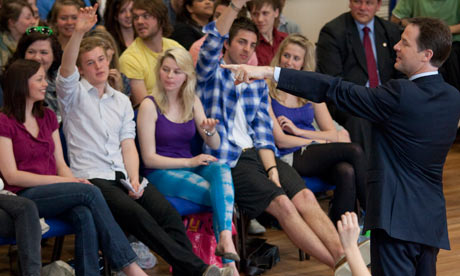The Lib Dem leader campaigned on a promise to abolish tuition fees but confidential papers show he had no such intention

Nick Clegg speaking at Oxford Brookes University before the 2010 general election. Photograph: Dan Chung for the Guardian
Nick Clegg has gone through some of the biggest highs and lows of any politician in recent years. During the 2010 general election campaign he was briefly as popular as wartime leader Winston Churchill and commentators talked about his "Obama-esque" poll ratings. For a short time Clegg and his inner circle thought seriously about the prospect of becoming prime minister in a Lib-Lab pact, having (they hoped) received a higher percentage of the general election vote than Labour.
It was a serious possibility, given that Labour was pushed into third place in a number of polls and the Liberal Democrats hoped to poll more than 100 seats. Of course it had evaporated by the end of the campaign and the Lib Dem leader was left with fewer seats, wounded pride and depression. He was devastated by the final result.
Next, the high of negotiating his party into government and himself as deputy prime minister, was rewarded with the low of a dramatic drop-off in the Lib Dem poll rating. Part of the reason was what was considered "the party's treachery" over tuition fees.
The Lib Dems had gone into the election promising to abolish tuition fees over two parliaments, while the two big parties had kicked the ball into the long grass through the Brown review, while privately recognising an increase in fees was highly likely. The party targeted university campuses with their campaign to abolish fees and its MPs and Clegg signed the NUS pledge not to vote for a rise in parliament. Clegg even made a direct appeal to students through a video, again making a promise to students about his party's intentions.
What students and potential voters did not know is that months before the general election David Laws, Chris Huhne, Danny Alexander and Clegg had met in secret as part of their preparations and decided that the abolition of tuition fees was not a priority for the party. This senior group had for some time been taking seriously the likelihood of a hung parliament and were meticulous in their preparations. In making their plans, the Lib Dems knew with certainty they would not be in government alone.
Thanks to confidential Liberal Democrat papers passed to me as part of my research for my book Five Days to Power, the evolution on the party's negotiating position is clear. By March 2010 the party had come to the clear position that the Lib Dems would not waste political capital pushing for the abolition of tuition fees. It was clear and unambiguous. This was a totemic party policy and it was to be ruthlessly sacrificed without any attempt to salvage it. The document said: "On tuition fees we should seek agreement on part-time students and leave the rest. We will have clear yellow water with the other [parties] on raising the tuition fee cap, so let us not cause ourselves more headaches."
With these words the full extent of the Lib Dem political calculation being made becomes clear. The party would gain its benefit from its public position vis-a-vis the other parties, but privately fighting for their key general election pledge was always a non-starter. Even more than two years later, I still find the level of cynicism involved quite shocking. The party's MPs and candidates were not told of the strategy.
So Clegg's apology this week is welcome. He is right, he should not have made the promises he did on tuition fees – they were unaffordable and he knew that. He is right his party had become irresponsible in opposition, making promises it knew it could never honour. The Lib Dems were well known for saying one thing is one area and the opposite in another and that culture had seeped into the party's DNA, hence its "treachery" on fees. But the Lib Dem leadership should not try to rewrite history. What the leadership did at the 2010 general election was pretty cynical and calculated. He knew he would not fight to abolish fees but said he would. This also requires an apology to the public and probably to the Liberal Democrat party as a whole, who were not aware of the leadership's position.
It is welcome that Clegg now realises his party needs to grow up and to turn its back on being a party of perpetual opposition and frivolous chancers. But he needs to do it with the full and open recognition of past mistakes, not a selective narrative that is historically inaccurate.

No comments:
Post a Comment